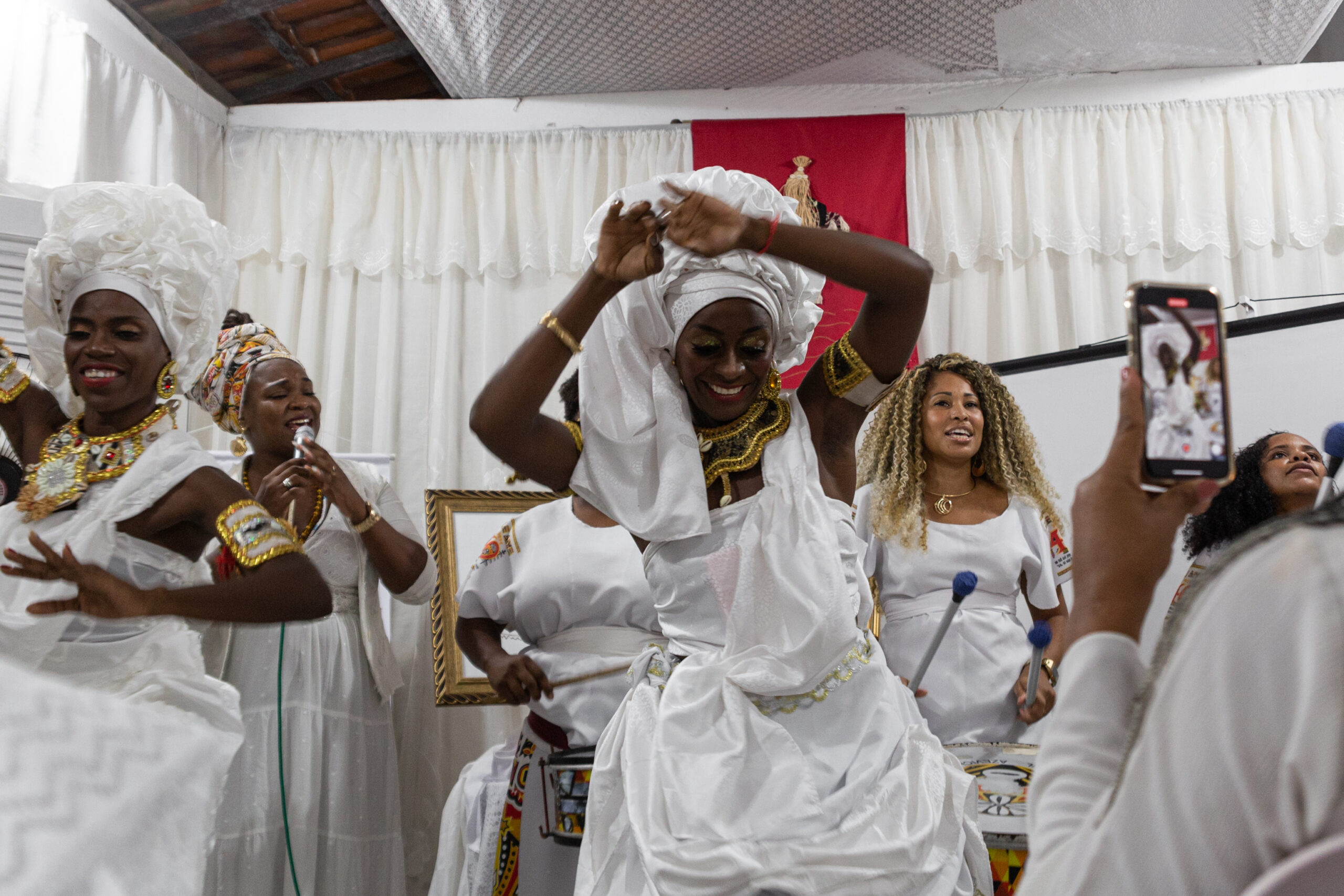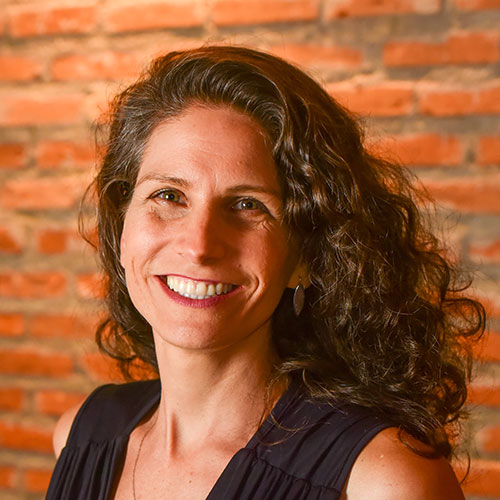Instituto da Mulher Negra Mãe Hilda Jitolu is founded in Salvador
Memory preservation should strengthen the family legacy of resistance that includes the actions of the Ilê Aiyê block


Mother Hilda Jitolu is an important personality in the national black movement. Born in 1923, she is the daughter of black Brazilians born during the country’s slavery period. She moved to the neighborhood of Curuzu, in Salvador, as a child, where she remained until her death, aged 86, in 2009.
Her trajectory of struggle for racial and social equality begins through Candomblé, an African-based religion where she started at age 19 for health reasons. In 1952, at only 29 years old, she founded the Acé Jitolu terreiro (meeting place) in her home, assuming the most powerful position in the candomblé hierarchy. From then on, a broad cultural work began and led to the formation of the first African block in Bahia, Ilê Aiyê.
Defender of human rights, she has always made a point of promoting beauty and respect for black populations in her home and yard, says Valéria Lima, founder of the Institute. “It was her who offered her children an emancipatory and anti-racist education, an environment that led to the creation of the Ilê Aiyê block”, she recalls.
The Instituto da Mulher Negra Mãe Hilda Jitolu was created to reinforce this legacy of struggle and is based on two pillars: the preservation of the memory of black women and the generation of income. “The idea is that we offer training to women, so that they can become professionals in some areas. We are initially focused on handicrafts, valuing handicrafts. We want these women to learn a trade that guarantees financial autonomy. The space will also welcome women who need a refuge for some reason”, explains Valéria.
Education, resistance and the fight against racism
The Curuzu neighborhood, where the Acé Jitolu terreiro operates, is on the outskirts of Salvador. Formerly, it was part of Liberdade, which was once considered by IBGE (Brazilian Institute of Geography and Statistics) to be the blackest neighborhood in the city. The Ilê Aiyê block appears in this scenario, in the late 1970s, made exclusively of black men. “At that time, black populations could not participate in the Carnival blocks in Bahia, except as workers. The moment was of Military Dictatorship. Even so, Mãe Hilda’s children and other men from the terreiro decided that the time had come to put their own block on the street”, says Valéria.
Mother Hilda gave her full support as a religious leader for the block to leave and not be criminalized. “To this day, the block is made up only of black men and women, and it should remain that way as long as there is racism in Brazil,” says Valéria.
According to Valéria, the Ilê Aiyê block began its social activities inspired by Mãe Hilda, after she founded a children’s school in the terreiro itself, in the late 1980s. Mother Hilda never went to school. She learned to sign her name late and was unhappy to see children loose in the street. That’s why she decided to open the doors of the terreiro to these children, to teach those who didn’t have access to education”, explains Valéria.
“Ilê also got together to go out at Carnival in the terreiro. It already functioned as the headquarters of the block when Mãe Hilda opened the school. It was from then on that Ilê began to carry out social actions, taking advantage of the children’s counter flow to offer pedagogical extension projects”, recalls Valéria, who is also Mãe Hilda’s granddaughter and registered the family’s legacy in her master’s thesis. “My mother makes Ilê’s costumes, this is also part of my family history. I am the third generation of black women who work with the movement”, she says.
In this process, Ilê became a cultural association and started to promote citizenship among children and young people through social projects based on dance, music and clothing, which refer to African ancestry. It was to preserve the memory of Mãe Hilda Jitolu and strengthen this legacy of resistance and combating racism that Valéria Lima founded the Institute, she explains.
Black feminism and grassroots movement
The idea of creating the Instituto da Mulher Negra Mãe Hilda Jitolu came up during the pandemic. “In June 2020, when everything was at a standstill, the world reviewing itself and finding itself again, this very strong question came to me: what could I do to contribute to other black women? I went to talk to my sister, who is a braider like me, with my mother and they were supportive”, recalls Valéria. The Institute’s headquarters are in the Acé Jitolu terreiro and have the participation of around 20 people from the community.
For her, the Institute is her way of contributing to society. Graduated in Journalism with a Masters in Ethnic and African Studies, Valéria Lima is part of the first generation of her family to attend higher education and says that she felt the need to repay everything that life has given her throughout her personal trajectory. Granddaughter of Mãe Hilda, she wrote about her biography during her master’s degree, which she completed in 2014. Valéria also worked for 12 years on public TV in Bahia, was editor of Portal Correio Nagô and director of Communication at Instituto Mídia Étnica.
The fact that it is an institute aimed at women has historical reasons. “For a long time I studied black feminists, Luiza Bairros, American authors like Angela Davis, and I felt the need to work on the practice of the institute within this black and feminist perspective. Because even though women have always played a leading role in the history of Ilê, we are talking about an organization managed exclusively by men. And despite being black men, gender differences will always exist. It is no wonder that black feminism exists,” says Valéria.
The centenary of Mãe Hilda and the founding of the Institute
The Institute was founded in October 2022. The official launch, however, took place only on January 6, 2023, during the celebration of Mãe Hilda’s centenary, in a historic event at the Acé Jitolu terreiro, where the Institute’s headquarters are located. With the support of the Secretariat for the Promotion of Racial Equality of Bahia and the presence of artists and politicians, the event was reported in several local and national newspapers.
The Institute received funds from a public notice to renovate the headquarters. It also received a donation from the photographer Robério Braga, who converted 50% of the sales of his book “Tranças Barrocas”. The book is the result of research on the millennial tradition of braid hairstyles, which begins with records and observation in the cities of Cachoeira and Salvador, in the neighborhoods of Curuzu, Pelourinho and Ribeira. The donation will be used to carry out workshops. The Institute also launched a stamp commemorating Mãe Hilda made by the Bahian artist Wilton Bernardo.
“Now we are raising new funds. I’m holding meetings with different organizations to really be able to start our work”, says Valéria. It is a lot of work! “Unfortunately, we still need to raise awareness, fight hard against racism. And we see that each generation of our family has learned to fight racism in a different way. Ilê did this with music, through dance, costumes, and all the movement. What the Institute does today in this third generation is to bring women so that they can learn trades, so that they can work. And also to take citizenship classes, interact, have a welcoming space to strengthen and continue fighting our daily racism”, warns Valéria.
Want to support this cause?
Follow the networks of Instituto da Mulher Negra Mãe Hilda Jitolu or get in touch by email:



